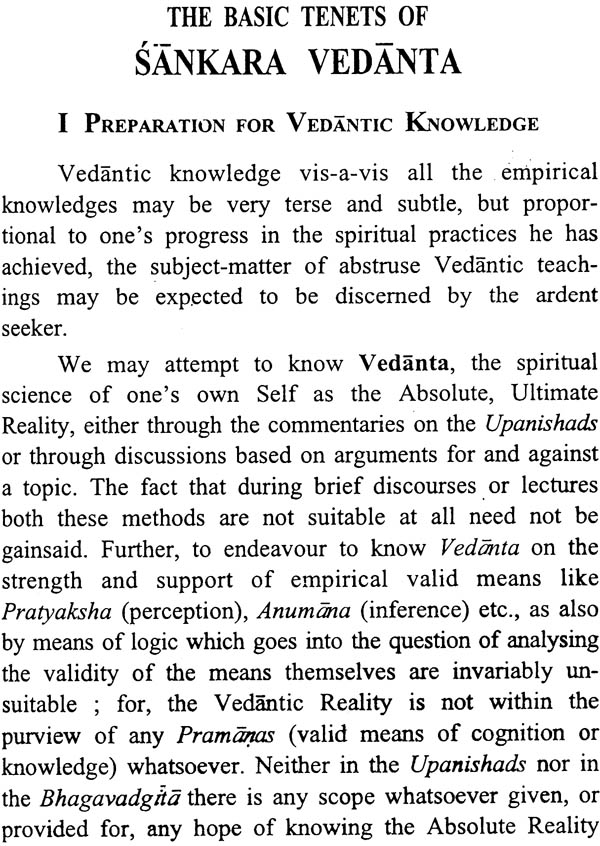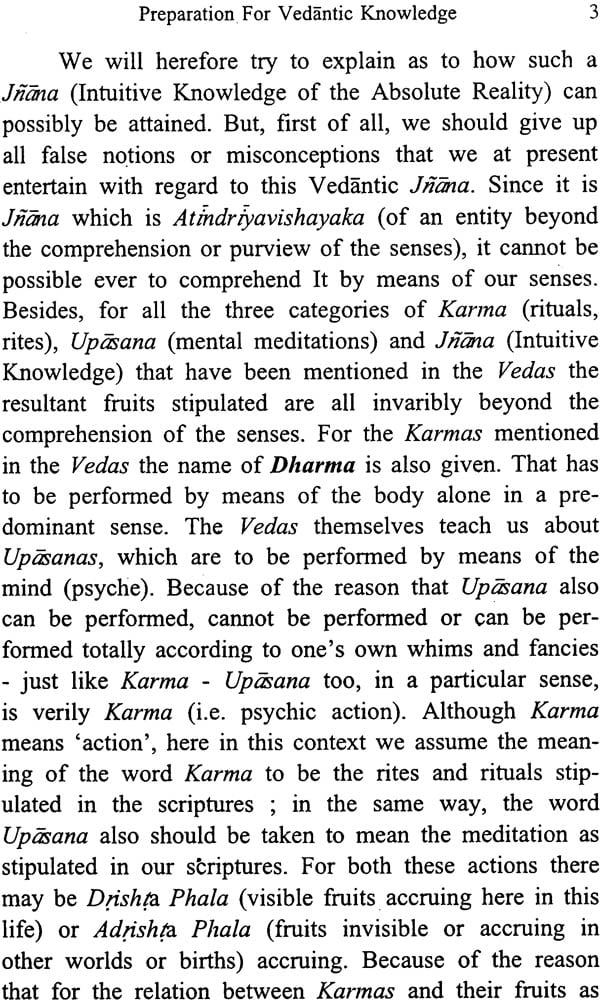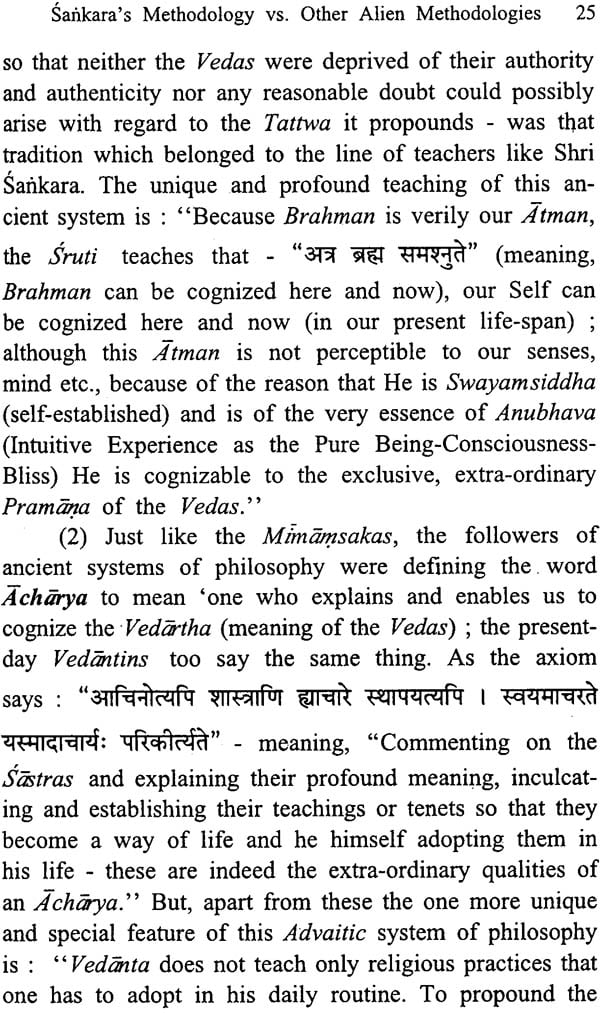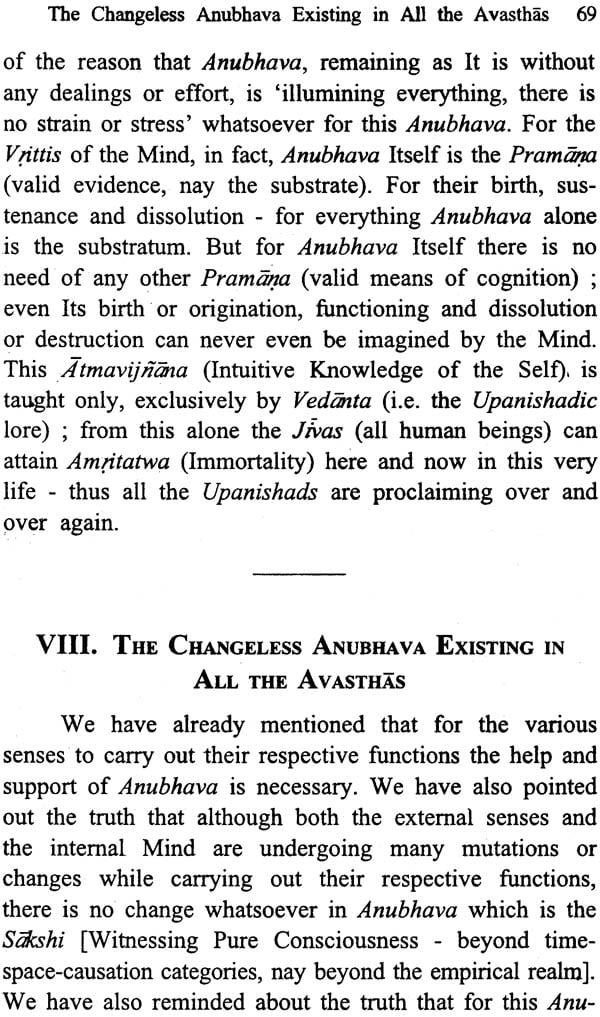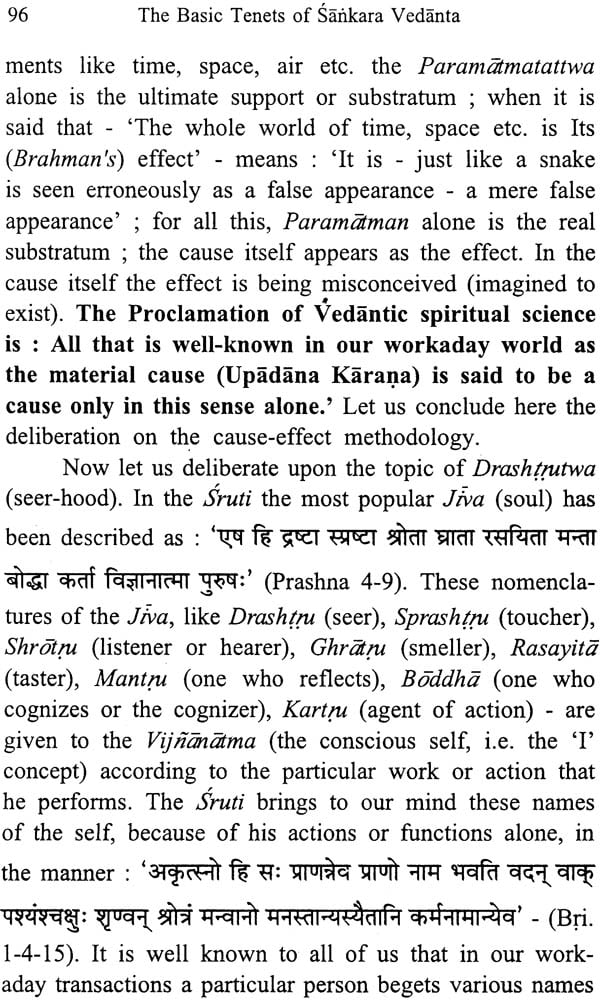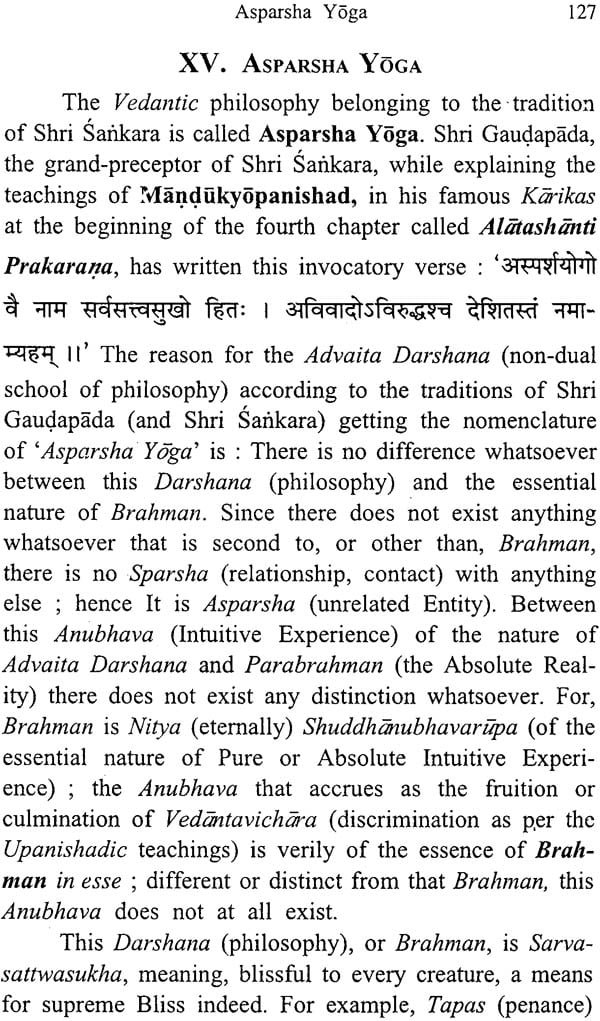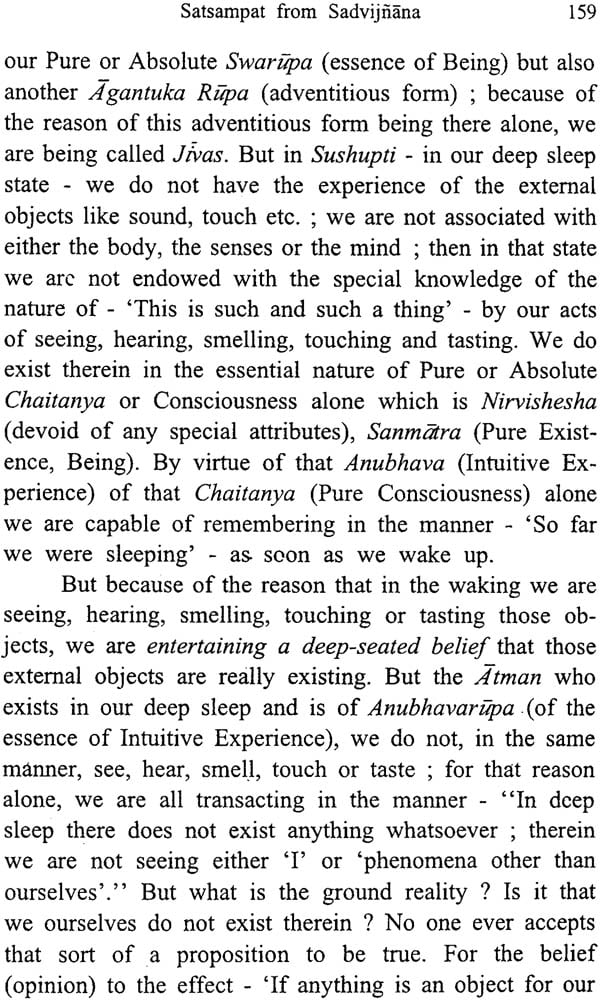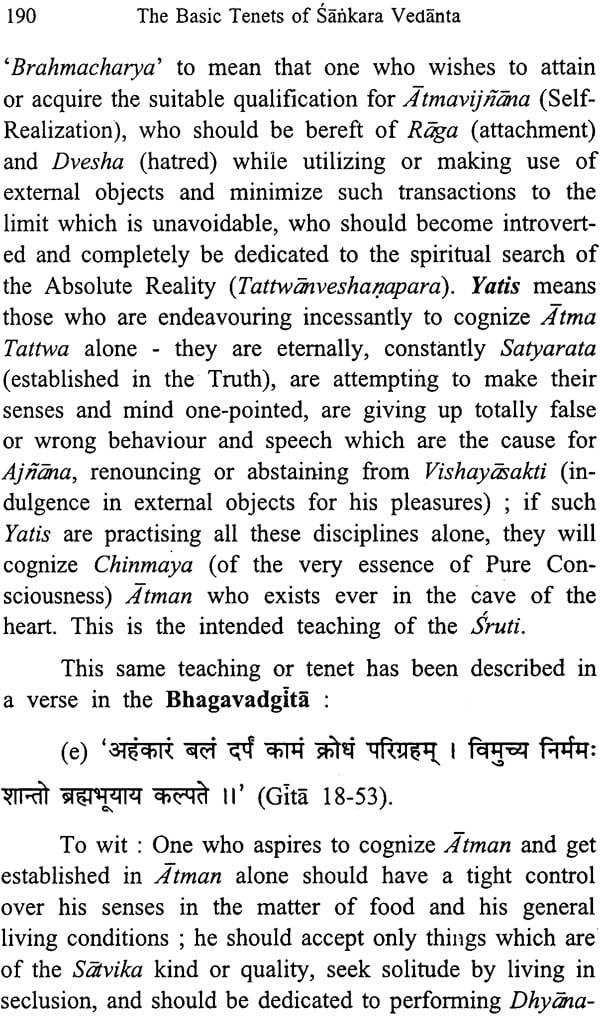
The Basic Tenets of Sankara Vedanta (An Old and Rare Book)
Book Specification
| Item Code: | NAK363 |
| Author: | D.B. Gangolli |
| Publisher: | Adhyatma Prakashan Karyalaya, Bangalore |
| Edition: | 1996 |
| Pages: | 201 |
| Cover: | PAPERBACK |
| Other Details | 8.0 inch X 5.0 inch |
| Weight | 180 gm |
Book Description
This is one of the important works written by Shri Satchidanandendra Saraswati Swamiji in Kannada exclusively meant for the new initiates into the highly-developed, esoteric spiritual science of Advaita Vedanta. If the true seeker carefully scrutinizes the 21 topics delineated by the revered Swamiji in his own inimitable lucid style, he will be able to equip and enlighten himself with the fundamental tenets of Vedanta which will kindle in his pure heart an abiding interest to cognize the eternal values of Life and its real goal. The highly beneficial approach of Intuitive reasoning and deliberation that is expected of him in order to ‘climb up’ the steep ladder of Moksha (Liberation) here in this very life will be available at his ‘back and call’, so to speak. These tenets are bound to bring about a vast change in the seeker’s perspective and to remove many a deepseated misconception, not barring the ‘I’ concept which, in the form of egoism or selfishness, is the root cause for all mundane miseries.
His Holiness Paramahamsa Sri Sri Satchidanandendra Saraswati Swamiji, the founder of Adhyatma Prakasha Karyalaya and author of over 200 reputed works on Advaita in Kannada, Sanskrit and English blessed the earth with his presence for ninety six useful and rich years useful and rich years (1880-1975).
His works are characterized by vast and deep scholarship, clear and precise perception and an attractive and lively style. His authentic interpretation of Sankara has been greatly recognized by both the East and the West. He was not just a rare and accomplished individual but a mighty and magnificent institution.
In these days of ever-increasing materialism ushered in by the quantum advance in scientific theories and technol- ogy, human beings all over the world are predominantly becoming extroverted, with the result a totally materialistic' proach to life in general has gripped all 'educated and enlightened' people.
Dharma (righteous, religious approach to Life) has suffered a deadly blow, so to speak ; the question of Artha (acquisition of one's assets, possessions) Kama (righteous desires) in consonance with the canons of one's religious faith have been forgotten ; people in general do not even know what exactly is the real, ultimate goal of Life (Parama Purushartha ).
But, despite all these deep incursions and intrusions of materialism, thanks to the 'scientific temper' among the intelligentsia, Man cannot really afford to be irreligious and non-spiritual. For, religion is purely and simply one's ‘abiding faith' in an inscrutable Shakti (power) which supports and sustains this expansive multi-faceted universe and all its various creatures. In fact, without this 'hypothetical' power called awara (Lord Creator of the universe as also its various creatures) one cannot think of this existence being meaningful, purposeful. It evolves from this method of reasoning, nay discrimination, that this 'Iswara' of Vedanta, the spiritual science par excellence of India, cannot be Paroksha (indirect, mediatory, external to us humans) but Aparoksha (immediate, direct) so as to culminate in every- one's Intuitive Experience and bring about total conviction, satisfaction to the properly qualified person irrespective of caste, creed, nation, sex etc.
Unlike the physical, empirical sciences which concentrate and converge upon the external, objective world at large and consider Man - or for that matter, all creatures, nay the whole creation - as a product of creation and a prey to the elemental forces, the spiritual science of Vedanta, which is more 'scientific' (rational) than all sciences founded by the human intellect put together, takes us in a 'quantum jump' to Intuition (Pure Being-Consciousness-Bliss) which gratuitously happens to be everyone's very core of Being, the Self (called in Vedantic parlance Atman, Brahman).
This treatise, written in Kannada by Shri Satchidanandendra Saraswati Swamiji, of revered memory, way back in 1966, deals with 'the basic tenets of Advaita Vedanta' as expounded by Adi Sankara in his extant Bhashyas. It depicts and delineates the rudiments of 'Non-dualism' and is sure to root out many a misconception prevalent in the minds of leading scientists, let alone the intelligentsia, the scholars and the academics. A casual scrutiny of the 21 topics dealt with herein will shed a tremendous but profound light on certain unknown regions of our so-called 'Knowledge'.
I am thankful to the authorities of Adhyatma Prakasha Karyalaya for permitting me to translate this magnum opus of revered Swamiji, and I am hereby surrendering to the Karyalaya Trust all copyrights of this book as in the past; I am also grateful to Shri R.N. Rangaswami and Shri Dileep B.K. for helping me in proof-reading of the manuscripts.
Even if a few ardent students of Adi Sankara's pristine pure Advaita Vedanta are benefited by this treatise I will deem it as fulfilment of my purport.
| I | Preparation for Vedantic knowledge | 1 |
| II | Ancient Vedantic Schools | 8 |
| III | Sankara's Methodology vs. Other Alien Methodologies | 23 |
| IV | Empirical Sciences | 35 |
| V | Varieties of Experiences | 42 |
| VI | Anubhava (Intuitive Experience) | 51 |
| VII | Anubhava Which is the Substrate for all Vyavahara | 60 |
| VIII | The Changeless Anubhava Existing in All the Avasthas | 69 |
| IX | Atman Who is Nirvishesha | 79 |
| X | The Reality Behind the Concepts of Karana and karya | 87 |
| XI | Jnatrutatta | 95 |
| XII | Amritatwa | 103 |
| XIII | Avasthatraya | 110 |
| XIV | Conclusion | 120 |
| XV | Asparsha Yoga | 127 |
| XVI | The Quintessence of the Teachings of Sastras & Acharya | 139 |
| XVII | Brahmatma Vijnana | 147 |
| XVIII | Satsampat from Sadvijnana | 154 |
| XIX | Brahmatma Vidya | 167 |
| XX | Sushuptama Tattwa | 176 |
| XXI | Spiritual Practices for Adhyatmavidya | 183 |
